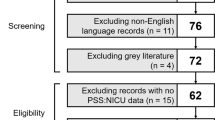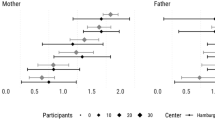Abstract
Objective:
Examine sources, predictors and child outcomes associated with neonatal intensive care unit (NICU)-related stress for mothers of infants born very preterm (VPT).
Study Design:
Participants were 133 mothers of VPT infants admitted to a regional level-III NICU. At term equivalent, mothers completed the Parental Stressor Scale: NICU and were interviewed about their psychological well-being and family circumstances. Infant clinical data were also collected. At corrected age 4 years, 49 children were assessed for cognition, language and socio-emotional development.
Result:
Mothers reported moderate to low stress, with parental role alteration considered most stressful and parent–staff communications least stressful. Predictors of overall stress included maternal educational underachievement, stressful life events, postnatal depression and infant unsettled-irregular behavior. NICU-related stress was associated with child anxiety and poorer language development.
Conclusion:
Parental well-being is an important focus of care in the neonatal setting. Strategies are needed to optimize early engagement and reduce stress levels to assist improved child outcomes.
This is a preview of subscription content, access via your institution
Access options
Subscribe to this journal
Receive 12 print issues and online access
$259.00 per year
only $21.58 per issue
Buy this article
- Purchase on Springer Link
- Instant access to full article PDF
Prices may be subject to local taxes which are calculated during checkout

Similar content being viewed by others
References
Holditch-Davis D, Miles MS . Mothers' stories about their experiences in the neonatal intensive care unit. Neonatal Netw 2000; 19 (3): 13–21.
Schappin R, Wijnroks L, Uniken Venema MM, Jongmans MJ . Rethinking stress in parents of preterm infants: a meta-analysis. PLoS One 2013; 8 (2): e54992.
Aucott S, Donohue PK, Atkins E, Allen MC . Neurodevelopmental care in the NICU. Ment Retard Dev Disabil Res Rev 2002; 8 (4): 298–308.
Clark CA, Woodward LJ, Horwood LJ, Moor S . Development of emotional and behavioral regulation in children born extremely preterm and very preterm: biological and social influences. Child Dev 2008; 79 (5): 1444–1462.
Frye RE, Malmberg B, Swank P, Smith K, Landry S . Preterm birth and maternal responsiveness during childhood are associated with brain morphology in adolescence. J Int Neuropsychol Soc 2010; 16 (5): 784–794.
Poehlmann J, Fiese BH . Parent-infant interaction as a mediator of the relation between neonatal risk status and 12-month cognitive development. Infant Behav Dev 2001; 24 (2): 171–188.
Treyvaud K, Anderson VA, Lee KJ, Woodward LJ, Newnham C, Inder TE et al. Parental mental health and early social-emotional development of children born. J Pediatr Psychol 2010; 35 (7): 768–777.
Singer LT, Salvator A, Guo S, Collin M, Lilien L, Baley J . Maternal psychological distress and parenting stress after the birth of a very low-birth-weight infant. JAMA 1999; 281 (9): 799–805.
Kersting A, Dorsch M, Wesselmann U, Lüdorff K, Witthaut J, Ohrmann P et al. Maternal posttraumatic stress response after the birth of a very low-birth-weight infant. J Psychosom Res 2004; 57 (5): 473–476.
Obeidat HM, Bond EA, Callister LC . The parental experience of having an infant in the newborn intensive care unit. J Perinat Educ 2009; 18 (3): 23–29.
Shields-Poë D, Pinelli J . Variables associated with parental stress in neonatal intensive care units. Neonatal Netw 1997; 16 (1): 29–37.
Miles MS, Funk SG, Kasper MA . The neonatal intensive care unit environment: sources of stress for parents. AACN Clin Issues Crit Care Nurs 1991; 2 (2): 346–354.
Doering LV, Moser DK, Dracup K . Correlates of anxiety, hostility, depression, and psychosocial adjustment in parents of NICU infants. Neonatal Netw 2000; 19 (5): 15–23.
Cronin CM, Shapiro CR, Casiro OG, Cheang MS . The impact of very low-birth-weight infants on the family is long lasting. A matched control study. Arch Pediatr Adolesc Med 1995; 149 (2): 151–158.
Montirosso R, Provenzi L, Calciolari G, Borgatti R . Group N-AS. Measuring maternal stress and perceived support in 25 Italian NICUs. Acta Paediatr 2012; 101 (2): 136–142.
Woodward LJ, Clark CA, Bora S, Inder TE . Neonatal white matter abnormalities an important predictor of neurocognitive outcome for very pretermchildren. PLoS One 2012; 7 (12): e51879.
Woodward LJ, Moor S, Hood KM, Champion PR, Foster-Cohen S, Inder TE et al. Very preterm children show impairments across multiple neurodevelopmental domains by age 4 years. Arch Dis Child Fetal Neonatal Ed 2009; 94 (5): F339–F344.
Miles MS, Funk SG, Carlson J . Parental Stressor Scale: neonatal intensive care unit. Nurs Res 1993; 42 (3): 148–152.
Franck LS, Cox S, Allen A, Winter I . Measuring neonatal intensive care unit-related parental stress. J Adv Nurs 2005; 49 (6): 608–615.
Brazelton TB, Nugent JK . Neonatal Behavioral Assessment Scale, 3rd edn, vol. 137. Mac Keith Press: London, 1995.
Cox JL, Holden JM, Sagovsky R . Detection of postnatal depression. Development of the 10-item Edinburgh Postnatal Depression Scale. Br J Psychiatry 1987; 150: 782–786.
Navarro P, Ascaso C, Garcia-Esteve L, Aguado J, Torres A, Martín-Santos R . Postnatal psychiatric morbidity: a validation study of the GHQ-12 and the EPDS as screening tools. Gen Hosp Psychiatry 2007; 29 (1): 1–7.
Holmes TH, Rahe RH . The Social Readjustment Rating Scale. J Psychosom Res 1967; 11 (2): 213–218.
Elley WB, Irving JC . The Elley-Irving Socio-Economic Index: 2001 census revision. New Zeal J Educ Stud 2003; 38: 3–17.
Wechsler Preschool and Primary Scale of Intelligence-Revised. The Psychological Corporation: San Antonio, TX, 1989.
Wiig EH, Secord W, Semel E . Clinical Evaluation of Language Fundamentals–Preschool: Examiner’s Manual. The Psychological Corporation: New York, 1992.
Goodman R . The Strengths and Difficulties Questionnaire: a research note. J Child Psychol Psychiatry 1997; 38 (5): 581–586.
Wereszczak J, Miles MS, Holditch-Davis D . Maternal recall of the neonatal intensive care unit. Neonatal Netw 1997; 16 (4): 33–40.
Affonso DD, Hurst I, Mayberry LJ, Haller L, Yost K, Lynch ME . Stressors reported by mothers of hospitalized premature infants. Neonatal Netw 1992; 11 (6): 63–70.
van der Pal SM, Maguire CM, le Cessie S, Wit JM, Walther FJ, Bruil J . Parental experiences during the first period at the neonatal unit after two developmental care interventions. Acta Paediatr 2007; 96 (11): 1611–1616.
Fleisher BE, VandenBerg K, Constantinou J, Heller C, Benitz WE, Johnson A et al. Individualized developmental care for very-low-birth-weight premature infants. Clin Pediatr (Phila) 1995; 34 (10): 523–529.
Turan T, Başbakkal Z, Ozbek S . Effect of nursing interventions on stressors of parents of premature infants in neonatal intensive care unit. J Clin Nurs 2008; 17 (21): 2856–2866.
Als H, Gilkerson L, Duffy FH, McAnulty GB, Buehler DM, Vandenberg K et al. A three-center, randomized, controlled trial of individualized developmental care for very low birth weight preterm infants: medical, neurodevelopmental, parenting, and caregiving effects. J Dev Behav Pediatr 2003; 24 (6): 399–408.
Brazelton T, Cramer B . The Earliest Relationship: Parents, Infants and the Drama of Early Attachment. Karnac Books, 2012.
Ichijima E, Kirk R, Hornblow A . Parental support in neonatal intensive care units: a cross-cultural comparison between New Zealand and Japan. J Pediatr Nurs 2011; 26 (3): 206–215.
Apter-Levy Y, Feldman M, Vakart A, Ebstein RP, Feldman R . Impact of maternal depression across the first 6 years of life on the child's mental health, social engagement, and empathy: the moderating role of oxytocin. Am J Psychiatry 2013; 170 (10): 1161–1168.
Giallo R, Cooklin A, Wade C, D'Esposito F, Nicholson JM . Maternal postnatal mental health and later emotional-behavioural development of children: the mediating role of parenting behaviour. Child Care Health Dev 2013 (doi:10.1111cch.12028).
Topol D, Girard N, Pierre L St, Tucker R, Vohr B . The effects of maternal stress and child language ability on behavioral outcomes of children with congenital hearing loss at 18-24months. Early Hum Dev 2011; 87 (12): 807–811.
Quittner AL, Barker DH, Cruz I, Snell C, Grimley ME, Botteri M et al. Parenting stress among parents of deaf and hearing children: associations with language delays and behavior problems. Parent Sci Pract 2010; 10 (2): 136–155.
Welch MG, Hofer MA, Brunelli SA, Stark RI, Andrews HF, Austin J et al. Family nurture intervention (FNI): methods and treatment protocol of a randomized controlled trial in the NICU. BMC Pediatr 2012; 12: 14.
Acknowledgements
This study was supported by grants from the Neurological Foundation of New Zealand (reference number: 0012/PG; 022/PG), the Health Research Council of New Zealand (reference number: 03/196), the Lottery Grants Board of New Zealand (reference number: AP84691) and the Washington University Intellectual and Developmental Disabilities Research Center (reference number: NIH/NICHD P30 HD062171). Special thanks to Dr Alessandra Raudino for her biostatistical advice and also to Michelle Davey, Jacqueline Ware and Dr Kelly Hood for their assistance with data collection. Most importantly, we would like to thank the families who supported and generously gave their time, free of charge, to the study.
Author information
Authors and Affiliations
Corresponding author
Ethics declarations
Competing interests
The authors declare no conflict of interest.
Rights and permissions
About this article
Cite this article
Woodward, L., Bora, S., Clark, C. et al. Very preterm birth: maternal experiences of the neonatal intensive care environment. J Perinatol 34, 555–561 (2014). https://doi.org/10.1038/jp.2014.43
Received:
Revised:
Accepted:
Published:
Issue Date:
DOI: https://doi.org/10.1038/jp.2014.43
This article is cited by
-
Implementing modified family integrated care in a U.S. neonatal intensive care unit: nursing perspectives and effects on parents
Journal of Perinatology (2023)
-
Parental mental health screening in the NICU: a psychosocial team initiative
Journal of Perinatology (2022)
-
The effects of webcams on German neonatal intensive care units – study protocol of a randomised crossover trial (Neo-CamCare)
BMC Health Services Research (2021)
-
Use of an internet camera system in the neonatal intensive care unit: parental and nursing perspectives and its effects on stress
Journal of Perinatology (2021)
-
An integrative review of maternal distress during neonatal intensive care hospitalization
Archives of Women's Mental Health (2021)



